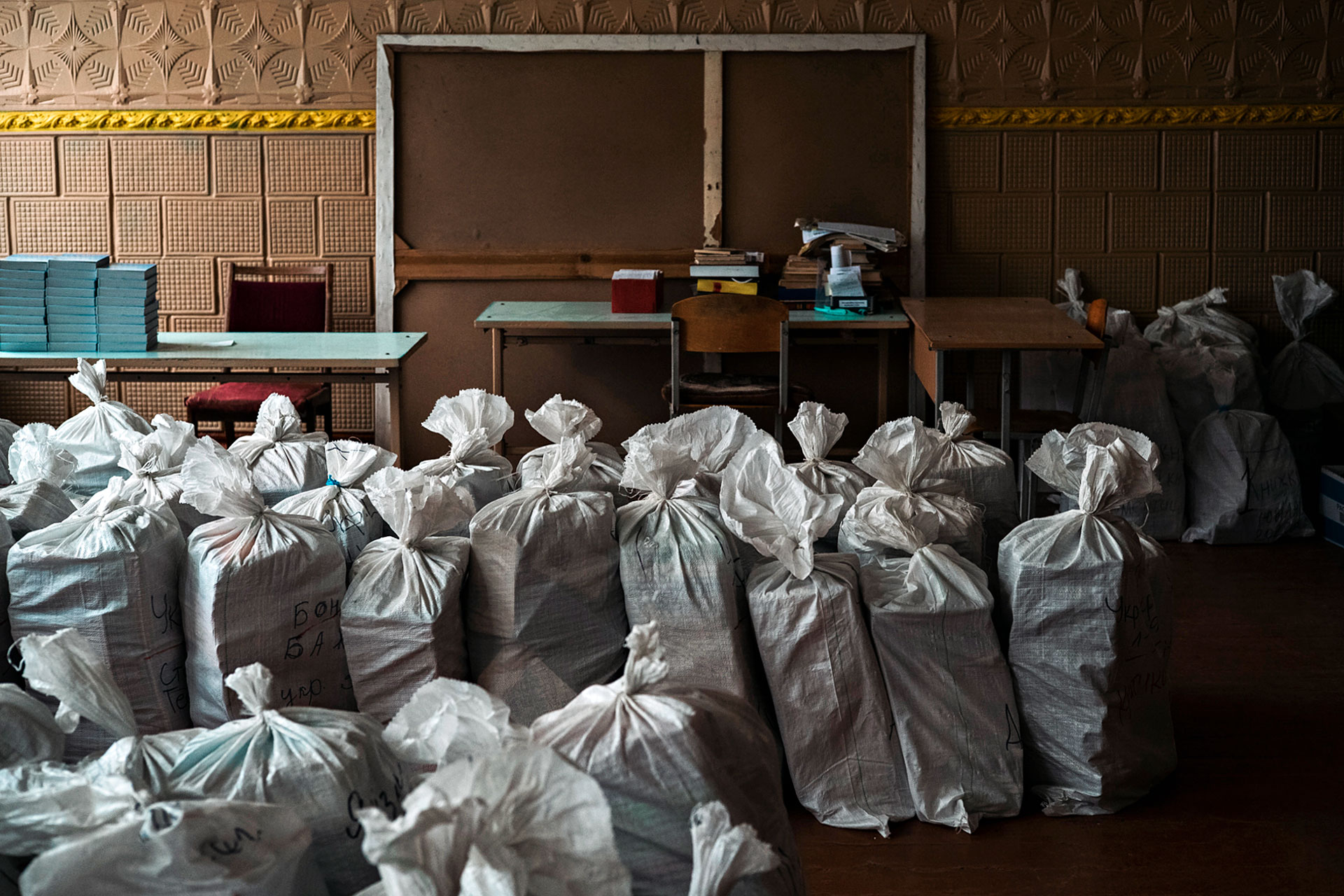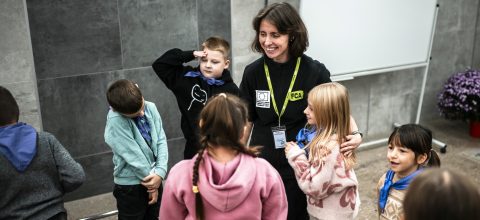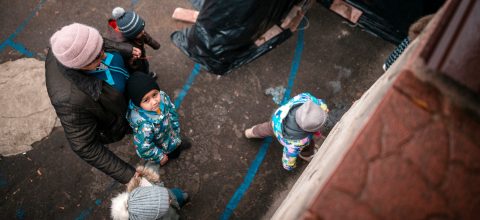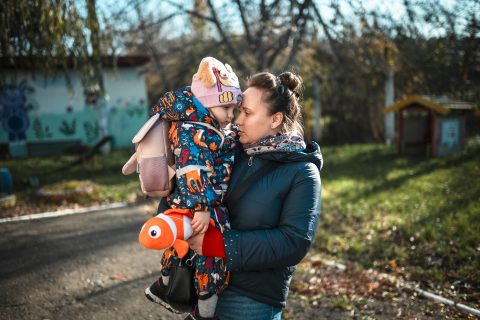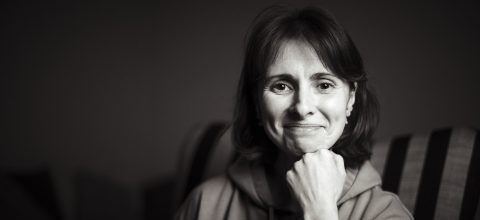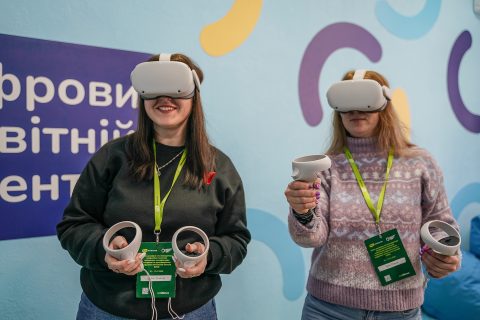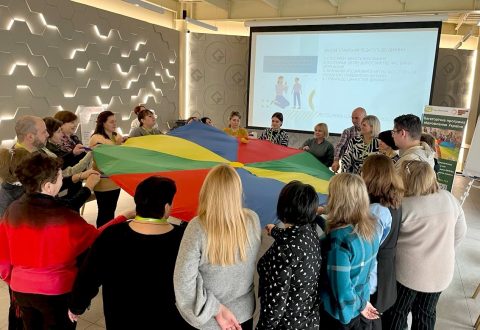A year that children shouldn’t have seen
Mother was injured in a rocket attack, father has spent a year in the army, and the children are missing the carefree life. A year of war has put an emotional strain on the Starodub family, just like many Ukrainian famillies. This year, they’re wishing for ordinary life without the sound of air-raid sirens.
MARIA, 10, concentrates on the image in the mirror, spreading violet eyeshadow on her eyelids. Mother Oksana sit next to her, watching her daughter with a horrified expression on her face.
In mid-January in Chernihiv, northern Ukraine, the Starodub family is celebrating New Year according to the Julian calendar. The children of the neighbourhood go from door to door singing, and they’re rewarded with sweets and small coins.
Maria gives her mother a grin and wonders how many sweets she’ll be able to collect tonight. The makeup has to be impressive, as children go singing dressed in colourful scarfs and flower headbands.
On the surface, everything seems normal; but in reality, nothing is. It’s lucky for Maria and her brother Kyryl to be able to enjoy both the presence of their father as well as their mother’s cooking today. The past year has been painful for the family.
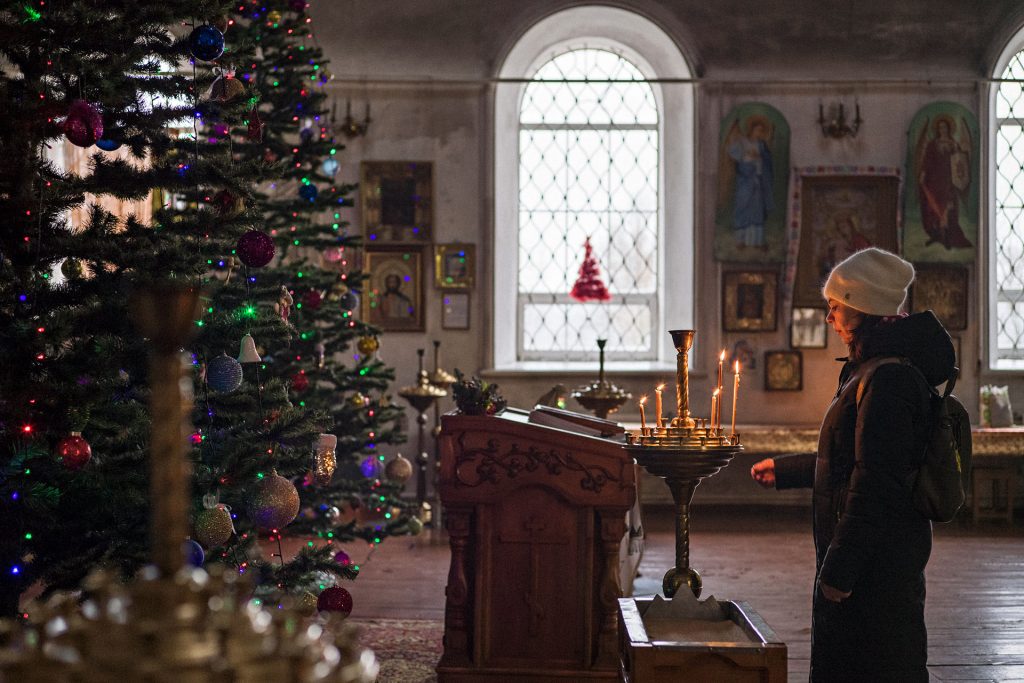
Chernihiv was under heavy fire
Ominous. That’s the word Oksana uses to describe the morning of 6 March 2022. Russia’s attack on Ukraine had lasted for a couple of weeks, and Chernihiv was under heavy fire.
In the morning Oksana was volunteering at the school where she teaches Ukrainian. Her husband Mykola had a career in the food industry, and he had enlisted in the regional forces of the Ukrainian army.
Around 5pm, Oksana ordered the children to go to the windowless hallway, the safest place in their home, where she and the children had slept on the floor every night ever since the attack began. Oksana was suffering from fever and resting in the bedroom of the dark house. She was on the phone to her husband when the strike hit. The windows exploded, and objects were flying around.
“I realised something happened to my legs. I was in shock. I was throwing stuff off my legs and dragged myself to my children,” Oksana describes.
“I could instantly tell that mum wasn’t alright. There was a lot of blood. Her hip had fractured,” Kyryl, 15, relates and recalls how he and her little sister bandaged the wound with a pony-patterned jumper. Mykola, left on the phone, understood the situation immediately and started to organise transportation for his wife together with other soldiers.
The entire family still remembers how heartbreakingly Maria cried that night.
Children need special attention
In war, children see and hear things they never should have to experience at such a young age.
In the Starodub family, the events are discussed openly to ensure that the children aren’t left alone with their thoughts. Maria particularly has been reacting to the events afterwards. Oksana says that so far, the family hasn’t needed help from a psychologist, but it’s something they might in the future.
The adults haven’t been able to avoid trauma either. Oksana recalls how, after her injury she layin a hospital bed on the fifth floor listening to bombings.
“The nurses rushed to the bomb shelter and told us patients to pray. The windows of the hospital were clinking,” she remembers with agony in her eyes.
In the middle of a crisis, the human mind yearns for routines and the feeling of normality; and the Starodub family has tried to cherish those moments during the exceptional year. Last summer, daughter Maria took part in summer clubs organised by Finn Church Aid and its local partner organisation DOCCU.
“It was wonderful,” she exclaims. “We were watching videos and doing activities together. I liked boardgames the most. Whilst playing them I met a girl who’s since become a good friend.”
The clubs were organised in July and August, and the children were also offered psychosocial support. Maria liked the clubs so much she attended them the whole summer.
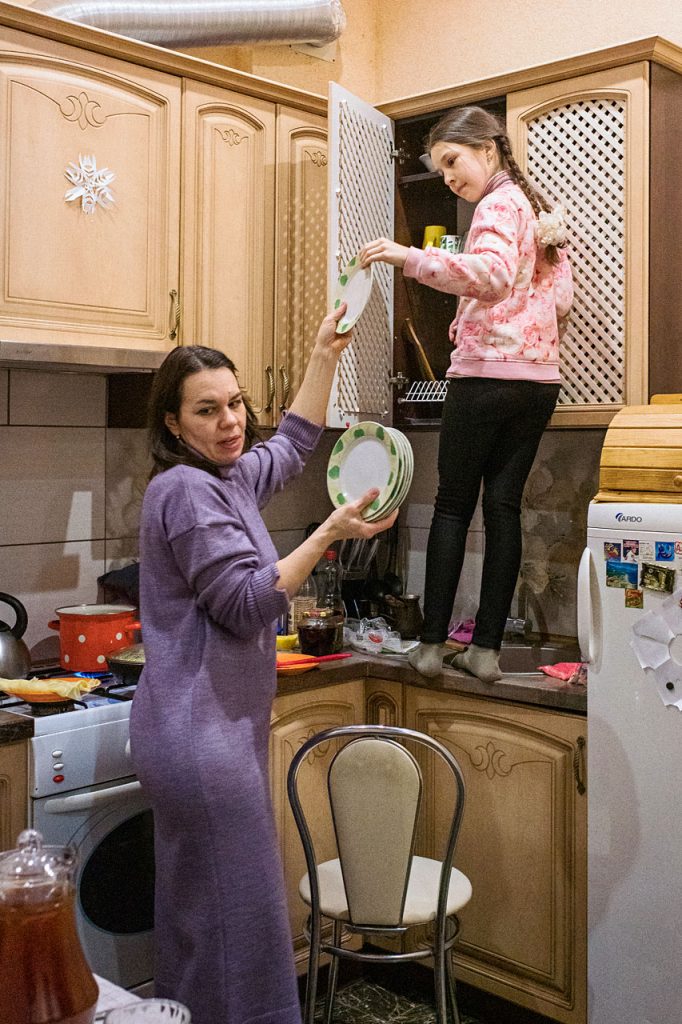
A rocket strike broke the windows
Russian forces withdrew from the Chernihiv area in late March and early April 2022. But in January 2023, bombed buildings, weekly air raid alerts and constant lack of electricity still remind people of the horrors of last spring.
Oksana’s school is now unheated. The windows, broken in a rocket strike, have already been fixed, but faults in the heating system keep the school in sub-zero temperatures. The walls have holes due to shelling. Oksana does her teaching remotely.
“I would love to get back to school, to my own blackboard, to see the children laughing,” she tells, wiping the corners of her eyes.
She says she returned to teaching in August after her legs had been operated on and she was able to start moving again.
“Then I met some of my students who’d graduated in the spring. I noticed that 9th-graders had become adults in just six months. War does that to children.”
According to Oksana, returning to teaching has been an empowering experience. She talks about the frontline of education and how important it is for the future of Ukrainians. She says that the war has increased the interest of children and adolescents in the history and cultural traditions of Ukraine. That warms the heart of a Ukrainian teacher.
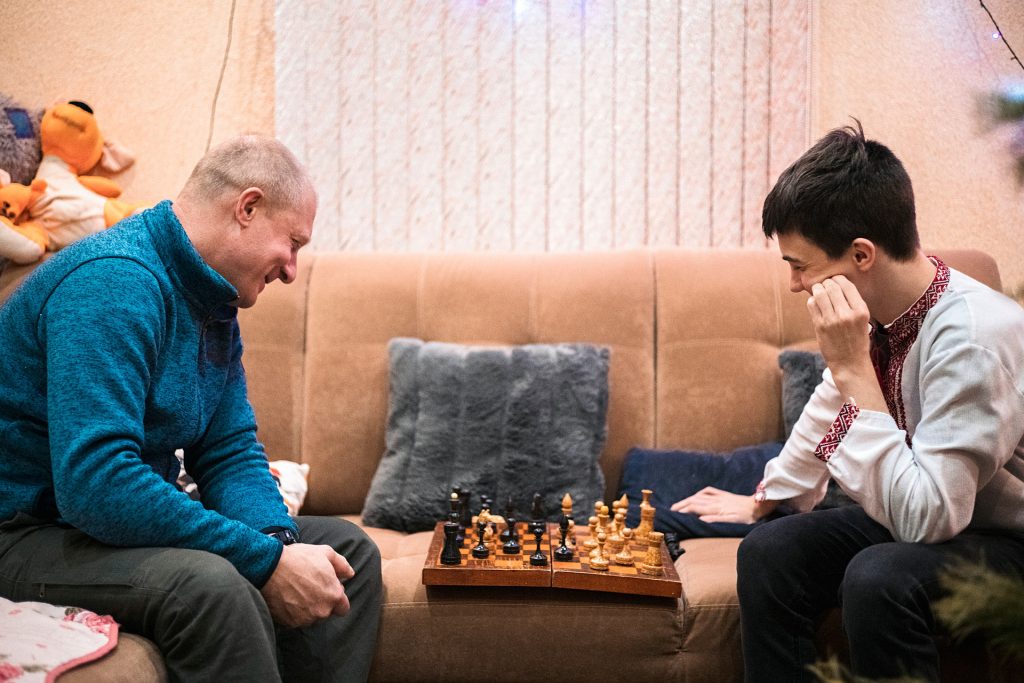
“When the war ends, I want to be home raising my children”
On the evening of 13 January, there’s plenty going on in the Starodub family kitchen. In the old Orthodox tradition, the day is first and foremost the celebration of Saint Basil the Great. The saint protects communities and the most vulnerable.
Mykola has a four-day vacation from the army. Every now and then Maria receives kisses from her father, to whom she presents her haul of sweets while singing. Kyryl is planning a chess game between the men of the house andstrokes the family’s cat Lord, who’s found a spot in the warmth of the kitchen radiator.
Oksana is frying Ukrainian pancakes to be filled with cottage cheese and dried fruit. There are plenty of familiar things for Finns on the table: these are stuffed cabbage leaves, that resemble a rosolli, and a pie that tastes like liver casserole.
There’s also kutia, a traditional Ukrainian treat for Christmas and new year, made from barley groats, raisins, nuts, and honey. On the day of Saint Basil the Great, there must be pork on the table, as that is believed to bring prosperity to the family.
Mykola eyes his wife and children warmly, with a faint and mysterious smile on his face.
“What we wish from the new year is winning the war and prosperity for Ukraine. When the war ends, I want to be home raising my children. I want an ordinary life without air raid alerts,” he tells.
The children also bring up very normal dreams. Last summer they couldn’t go swimming, because the beach in their town was said to be mined. Maria also dreams of travelling within her home country and seeing all the places she’s read about.
The conversation pauses when the doorbell rings. Another group of children dressed up in traditional costume sings at the door. As they leave, the children wish the family all the best: health, peace, and good times together.
All the best is needed, indeed; Oksana and Mykola have heavy hearts knowing the war will rage on, and Mykola has been transferred closer to the frontline.
Text: Ulriikka Myöhänen
Translation: Anne Salomäki
Kuvat: Antti Yrjönen
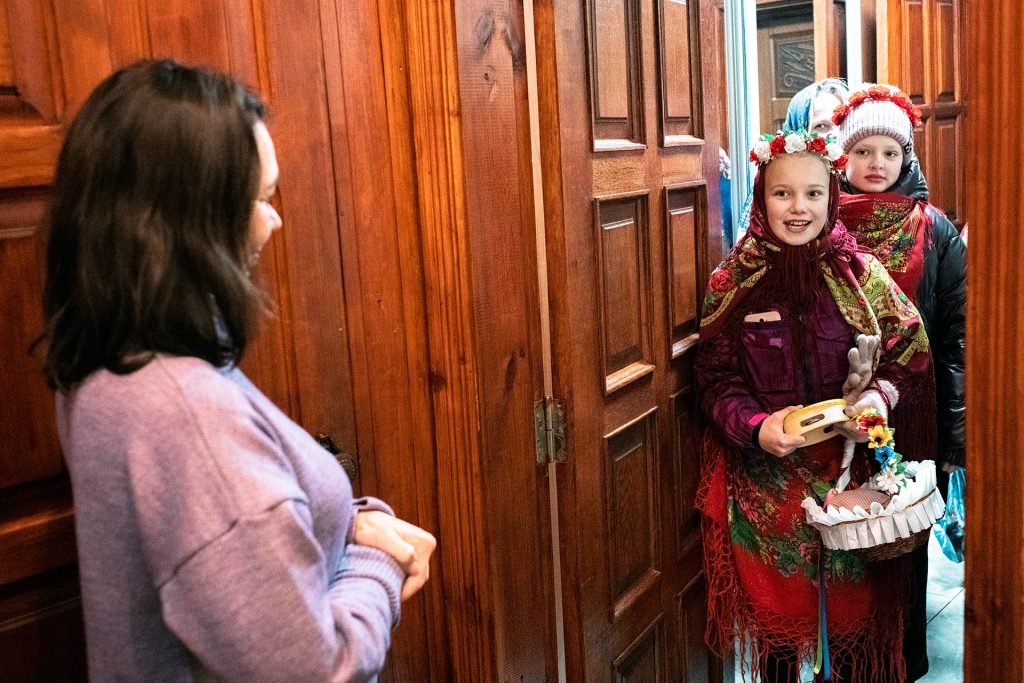
FCA focuses on education and psychosocial support
The work of Finn Church Aid began in Ukraine in February 2022 as emergency aid, which was delivered in co-operation with the Hungarian partner organisation Hungarian Interchurch Aid. Later, Finn Church Aid established its own country office in Ukraine and started working on education in Chernihiv, northern Ukraine. In collaboration with partner organisations, aid is delivered to other parts of Ukraine as well.
Almost 6 000 children took part in Finn Church Aid’s summer clubs. On top of this, approximately 530 teachers have been provided with training, and 70 teachers and school psychologists have participated in psychosocial support training.
A joint 14-million project by FCA, international Save the Children, People in Need, and War Child, funded by the EU, is set to reach 45 000 children during 2023. As part of the project, schools damaged by the war are repaired, psychosocial support is provided, and teachers are trained.
